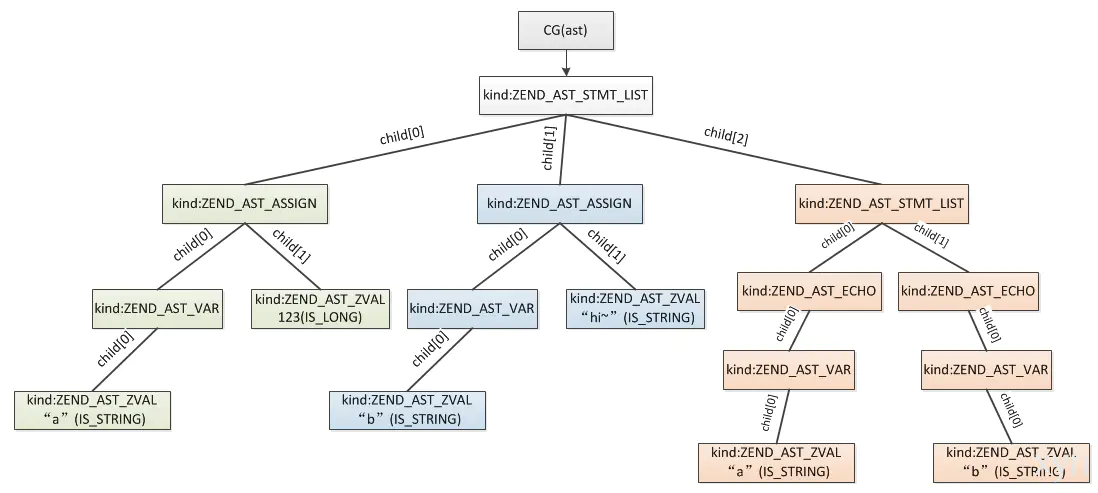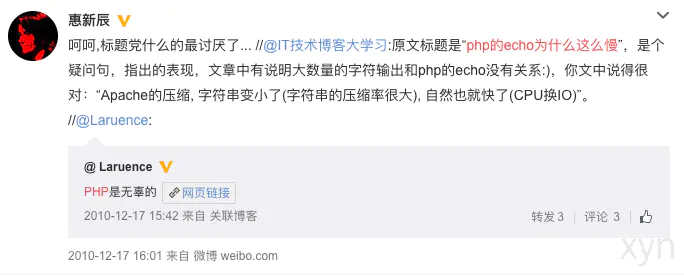Detailed explanation of the echo statement in PHP
This article will give you an in-depth understanding of the echo statement in PHP. It has certain reference value. Friends in need can refer to it. I hope it will be helpful to everyone.

1. Overview
echo is often used as a language structure in PHP, so It is still necessary to understand its implementation.
| Version | Source code address |
|---|---|
PHP-7.2.8 |
https://github.com/php/php-src/tree/PHP-7.2.8/ |
2、官方文档(php.net)
2.1 输出一个或多个字符串
void echo ( string $arg1 [, string $... ] )
- 文档地址:http://php.net/manual/zh/function.echo.php
2.2 说明
echo不是一个函数,是一个PHP的语言结构,因此不一定要使用小括号来指明参数,单引号、双引号都行.echo不表现得像一个函数,所以不能总是使用一个函数的上下文。echo输出多个字符串的时候, 不能使用小括号。echo在php.ini中启用short_open_tag时,有一个快捷用法(view层)<?= 'Hello World'; ?>echo和echo接受参数列表,并且没有返回值。
2.3 注释
Note: 因为是一个语言构造器而不是一个函数,不能被 可变函数 调用。
<?php /** * Tip * 相对 echo 中拼接字符串而言,传递多个参数比较好,考虑到了 PHP 中连接运算符(“.”)的优先级。 传入多个参数,不需要圆括号保证优先级: */ echo "Sum: ", 1 + 2; echo "Hello ", isset($name) ? $name : "John Doe", "!"; /** Tip * 如果是拼接的,相对于加号和三目元算符,连接运算符(“.”)具有更高优先级。为了正确性,必须使用圆括号: */ echo 'Sum: ' . (1 + 2); echo 'Hello ' . (isset($name) ? $name : 'John Doe') . '!';
3、应用
3.1 输出基本数据类型
echo 123, 'abc', [12, 34]; // 123abcArray echo "Sum: ", 1 + 2; // Sum: 3 echo 'Sum: ' . (1 + 2); // Sum: 3 echo "Hello ", isset($name) ? $name : "John Doe", "!"; // Hello John Doe! echo 'Hello ' . (isset($name) ? $name : 'John Doe') . '!'; // Hello John Doe!
3.2 输出对象类型
<?php
class Customer {
public function say() {
return 'Hello World';
}
}
echo (new Customer());Catchable fatal error: Object of class Customer could not be converted to string in /usercode/file.php on line 8
输出对象时汇报以上错误, 所以如果需要输出对象, 一定要在其内部实现 __toString()。
<?php
class Customer {
public function say() {
return 'Hello World';
}
/**
* __toString() 方法用于一个类被当成字符串时应怎样回应。例如 echo $obj; 应该显示些什么。此方法必须返回一个字符串,否则将发出一条 E_RECOVERABLE_ERROR 级别的致命错误。
*/
public function __toString(){
return $this->say();
}
}
echo (new Customer()); // Hello World3.3 输出资源类型
echo tmpfile(); // Resource id #1
4、源码
4.1 源码概述
php 是一门脚本语言, 所以所有的符号都会先经过词法解析和语法解析阶段, 这两个阶段由lex & yacc 完成。
在计算机科学里面,
lex是一个产生词法分析器的程序。Lex常常与yacc语法分析器产生程序一起使用。Lex是许多UNIX系统的标准词法分析器产生程序,而且这个工具所作的行为被详列为POSIX标准的一部分。Lex读进一个代表词法分析器规则的输入字符串流,然后输出以C语言实做的词法分析器源代码。 --维基百科
对应的文件在 Zend/zend_language_parser.y 和 Zend/zend_language_scanner.l。
4.2 字符转标记(Zend/zend_language_scanner.l)
<ST_IN_SCRIPTING>"echo" {
RETURN_TOKEN(T_ECHO);
}ZEND引擎在读取一个PHP文件之后会先进行词法分析,就是用lex扫描,把对应的PHP字符转换成相应的标记(也叫token),比如 echo $a; 在碰到这句首先会匹配到echo,符合上面的规则,然后就返回一个 T_ECHO 标记,这个在后面的语法分析会用上,也就是在 zend_language_parser.y 文件中
4.3 语法分析(Zend/zend_language_parser.y)
# %token Token就是一个个的“词块”
%token T_ECHO "echo (T_ECHO)"
# statement T_ECHO echo_expr_list
statement:
'{' inner_statement_list '}' { ? = $2; }
| if_stmt { ? = $1; }
| alt_if_stmt { ? = $1; }
| T_WHILE '(' expr ')' while_statement
{ ? = zend_ast_create(ZEND_AST_WHILE, $3, $5); }
| T_DO statement T_WHILE '(' expr ')' ';'
{ ? = zend_ast_create(ZEND_AST_DO_WHILE, $2, $5); }
| T_FOR '(' for_exprs ';' for_exprs ';' for_exprs ')' for_statement
{ ? = zend_ast_create(ZEND_AST_FOR, $3, $5, $7, $9); }
| T_SWITCH '(' expr ')' switch_case_list
{ ? = zend_ast_create(ZEND_AST_SWITCH, $3, $5); }
| T_BREAK optional_expr ';' { ? = zend_ast_create(ZEND_AST_BREAK, $2); }
| T_CONTINUE optional_expr ';' { ? = zend_ast_create(ZEND_AST_CONTINUE, $2); }
| T_RETURN optional_expr ';' { ? = zend_ast_create(ZEND_AST_RETURN, $2); }
| T_GLOBAL global_var_list ';' { ? = $2; }
| T_STATIC static_var_list ';' { ? = $2; }
| T_ECHO echo_expr_list ';' { ? = $2; }
| T_INLINE_HTML { ? = zend_ast_create(ZEND_AST_ECHO, $1); }
| expr ';' { ? = $1; }
| T_UNSET '(' unset_variables ')' ';' { ? = $3; }
| T_FOREACH '(' expr T_AS foreach_variable ')' foreach_statement
{ ? = zend_ast_create(ZEND_AST_FOREACH, $3, $5, NULL, $7); }
| T_FOREACH '(' expr T_AS foreach_variable T_DOUBLE_ARROW foreach_variable ')'
foreach_statement
{ ? = zend_ast_create(ZEND_AST_FOREACH, $3, $7, $5, $9); }
| T_DECLARE '(' const_list ')'
{ zend_handle_encoding_declaration($3); }
declare_statement
{ ? = zend_ast_create(ZEND_AST_DECLARE, $3, $6); }
| ';' /* empty statement */ { ? = NULL; }
| T_TRY '{' inner_statement_list '}' catch_list finally_statement
{ ? = zend_ast_create(ZEND_AST_TRY, $3, $5, $6); }
| T_THROW expr ';' { ? = zend_ast_create(ZEND_AST_THROW, $2); }
| T_GOTO T_STRING ';' { ? = zend_ast_create(ZEND_AST_GOTO, $2); }
| T_STRING ':' { ? = zend_ast_create(ZEND_AST_LABEL, $1); }
;在 statement 看到了 T_ECHO, 后面跟着 echo_expr_list,再搜这个字符串,找到如下代码:
# echo_expr_list
echo_expr_list:
echo_expr_list ',' echo_expr { ? = zend_ast_list_add($1, $3); }
| echo_expr { ? = zend_ast_create_list(1, ZEND_AST_STMT_LIST, $1); }
;
echo_expr:
expr { ? = zend_ast_create(ZEND_AST_ECHO, $1); }
;
expr:
variable { ? = $1; }
| expr_without_variable { ? = $1; }
;词法分析后得到单独存在的词块不能表达完整的语义,还需要借助规则进行组织串联。语法分析器就是这个组织者。它会检查语法、匹配Token,对Token进行关联。PHP7中,组织串联的产物就是抽象语法树(Abstract Syntax Tree,AST), 详情请查看相关源码: 抽象语法树(Abstract Syntax Tree,AST)
这么看比较难理解,接下来我们从一个简单的例子看下最终生成的语法树。
$a = 123; $b = "hi~"; echo $a,$b;
具体解析过程这里不再解释,有兴趣的可以翻下zend_language_parse.y中,这个过程不太容易理解,需要多领悟几遍,最后生成的ast如下图:

4.4 模块初始化(main/main.c)
通过 write_function 绑定PHP输出函 数php_output_wrapper 至 zend_utility_functions结构体, 此结构体会在xx被使用
# php_module_startup zend_utility_functions zuf; // ... gc_globals_ctor(); zuf.error_function = php_error_cb; zuf.printf_function = php_printf; zuf.write_function = php_output_wrapper; zuf.fopen_function = php_fopen_wrapper_for_zend; zuf.message_handler = php_message_handler_for_zend; zuf.get_configuration_directive = php_get_configuration_directive_for_zend; zuf.ticks_function = php_run_ticks; zuf.on_timeout = php_on_timeout; zuf.stream_open_function = php_stream_open_for_zend; zuf.printf_to_smart_string_function = php_printf_to_smart_string; zuf.printf_to_smart_str_function = php_printf_to_smart_str; zuf.getenv_function = sapi_getenv; zuf.resolve_path_function = php_resolve_path_for_zend; zend_startup(&zuf, NULL);
zuf 是一个 zend_utility_functions 结构体,这样就把php_output_wrapper函数传给了zuf.write_function,后面还有好几层包装,最后的实现也是在main/main.c文件里面实现的,是下面这个函数:
/* {{{ php_output_wrapper
*/
static size_t php_output_wrapper(const char *str, size_t str_length)
{
return php_output_write(str, str_length);
}在 php_out_wrapper 中调用的 php_output_write 在 main/output.c 中实现, 实现代码如下:
/* {{{ int php_output_write(const char *str, size_t len)
* Buffered write
* #define PHP_OUTPUT_ACTIVATED 0x100000
* 当flags=PHP_OUTPUT_ACTIVATED,会调用sapi_module.ub_write输出, 每个SAPI都有自已的实现, cli中是调用sapi_cli_single_write()
* php_output_write(); //输出,有buffer, 调用php_output_op()
* php_output_write_unbuffered();//输出,没有buffer,调用PHP_OUTPUT_ACTIVATED,会调用sapi_module.ub_write
* php_output_set_status(); //用于SAPI设置output.flags
* php_output_get_status(); //获取output.flags的值
*/
PHPAPI size_t php_output_write(const char *str, size_t len)
{
if (OG(flags) & PHP_OUTPUT_ACTIVATED) {
php_output_op(PHP_OUTPUT_HANDLER_WRITE, str, len);
return len;
}
if (OG(flags) & PHP_OUTPUT_DISABLED) {
return 0;
}
return php_output_direct(str, len);
}
/* }}} */4.5 输出的终点(main/output.c fwrite函数)
不调用sapi_module的输出
static size_t (*php_output_direct)(const char *str, size_t str_len) = php_output_stderr;
static size_t php_output_stderr(const char *str, size_t str_len)
{
fwrite(str, 1, str_len, stderr);
/* See http://support.microsoft.com/kb/190351 */
#ifdef PHP_WIN32
fflush(stderr);
#endif
return str_len;
}调用sapi_module的输出
sapi_module.ub_write(context.out.data, context.out.used);
if (OG(flags) & PHP_OUTPUT_IMPLICITFLUSH) {
sapi_flush();
}php_output_op 详细实现如下:
/* {{{ static void php_output_op(int op, const char *str, size_t len)
* Output op dispatcher, passes input and output handlers output through the output handler stack until it gets written to the SAPI
*/
static inline void php_output_op(int op, const char *str, size_t len)
{
php_output_context context;
php_output_handler **active;
int obh_cnt;
if (php_output_lock_error(op)) {
return;
}
php_output_context_init(&context, op);
/*
* broken up for better performance:
* - apply op to the one active handler; note that OG(active) might be popped off the stack on a flush
* - or apply op to the handler stack
*/
if (OG(active) && (obh_cnt = zend_stack_count(&OG(handlers)))) {
context.in.data = (char *) str;
context.in.used = len;
if (obh_cnt > 1) {
zend_stack_apply_with_argument(&OG(handlers), ZEND_STACK_APPLY_TOPDOWN, php_output_stack_apply_op, &context);
} else if ((active = zend_stack_top(&OG(handlers))) && (!((*active)->flags & PHP_OUTPUT_HANDLER_DISABLED))) {
php_output_handler_op(*active, &context);
} else {
php_output_context_pass(&context);
}
} else {
context.out.data = (char *) str;
context.out.used = len;
}
if (context.out.data && context.out.used) {
php_output_header();
if (!(OG(flags) & PHP_OUTPUT_DISABLED)) {
#if PHP_OUTPUT_DEBUG
fprintf(stderr, "::: sapi_write('%s', %zu)\n", context.out.data, context.out.used);
#endif
sapi_module.ub_write(context.out.data, context.out.used);
if (OG(flags) & PHP_OUTPUT_IMPLICITFLUSH) {
sapi_flush();
}
OG(flags) |= PHP_OUTPUT_SENT;
}
}
php_output_context_dtor(&context);
}以上了解了PHP输出函数的实现, 接下来了解echo实现.
4.6 输出动作的ZEND引擎实现(Zend/zend_vm_def.h)
ZEND_VM_HANDLER(40, ZEND_ECHO, CONST|TMPVAR|CV, ANY)
{
USE_OPLINE
zend_free_op free_op1;
zval *z;
SAVE_OPLINE();
z = GET_OP1_ZVAL_PTR_UNDEF(BP_VAR_R);
if (Z_TYPE_P(z) == IS_STRING) {
zend_string *str = Z_STR_P(z);
if (ZSTR_LEN(str) != 0) {
zend_write(ZSTR_VAL(str), ZSTR_LEN(str));
}
} else {
zend_string *str = _zval_get_string_func(z);
if (ZSTR_LEN(str) != 0) {
zend_write(ZSTR_VAL(str), ZSTR_LEN(str));
} else if (OP1_TYPE == IS_CV && UNEXPECTED(Z_TYPE_P(z) == IS_UNDEF)) {
GET_OP1_UNDEF_CV(z, BP_VAR_R);
}
zend_string_release(str);
}
FREE_OP1();
ZEND_VM_NEXT_OPCODE_CHECK_EXCEPTION();
}可以看到在 zend vm 中通过调用zend_write来实现输出,接下来看下zend_write的实现。
4.7 zend_write实现(Zend/zend.c)
# Zend/zend.h typedef int (*zend_write_func_t)(const char *str, size_t str_length); # Zend/zend.c ZEND_API zend_write_func_t zend_write; # 如下图所示, zend_write的初始化是在zend_startup()函数里面,这是zend引擎启动的时候需要做的一些初始化工作,有下面一句: zend_write = (zend_write_func_t) utility_functions->write_function; // php_output_wrapper
zend_utility_functions *utility_functions 在 main/main.c php_module_startup()的 zuf中被定义:
zuf.write_function = php_output_wrapper;

5、php(echo)加速
5.1 PHP echo 真的慢么?

echo 输出大字符串(500K)的时候,执行时间会明显变长,所以会被认为PHP的echo性能很差, 实际上这并不是语言(PHP)问题, 而是一个IO问题(IO的速度限制了输出的速度)。
但是在某些时候echo执行时间过长, 会影响其他的服务, 进而影响整个系统。
那么使用 apache 时如何优化使的 echo 变快, 让PHP的请求处理过程尽快结束?
5.2 还是可以优化的: 打开输出缓存
echo慢是在等待“写数据”成功返回, 所以可打开输出缓存:
# 编辑php.ini output_buffering = 4096 //bytes # 调用ob_start() ob_start(); echo $hugeString; ob_end_flush();
ob_start()会开辟一块4096大小的buffer,所以如果$hugeString大于 4096,将不会起到加速作用。
echo 会立即执行成功返回, 因为数据暂时写到了我们的输出缓存中,如果buffer足够大,那么内容会等到脚本的最后,才一次性的发送给客户端(严格的说是发给webserver)。
6、输出时的类型转换
6.1 输出时的类型转换规则
| input | output | desc | code |
|---|---|---|---|
| Boolean | String | 1 或 0 | echo true; // 1 |
| Integer | Integer | 不转换 | echo 123; // 123 |
| Float | Float | 不转换, 注意精度问题 | echo 123.234; // 123.234 |
| String | String | 不转换 | echo 'abcd'; // abcd |
| Array | Array | - | echo [12, 34]; // Array |
| Object | Catchable fatal error | Object of class stdClass could not be converted to string in file.php on line * | echo json_decode(json_encode(['a' => 'b'])); |
| Resource | Resource id #1 | - | echo tmpfile(); // Resource id #1 |
| NULL | string | 转为空字符串 | echo null; // 空字符串 |
6.2 输出时的类型转换源码(Zend/zend_operators.h & Zend/zend_operators.c)
# Zend/zend_operators.h
ZEND_API zend_string* ZEND_FASTCALL _zval_get_string_func(zval *op);
# Zend/zend_operators.c
ZEND_API zend_string* ZEND_FASTCALL _zval_get_string_func(zval *op) /* {{{ */
{
try_again:
switch (Z_TYPE_P(op)) {
case IS_UNDEF:
case IS_NULL:
case IS_FALSE:
return ZSTR_EMPTY_ALLOC();
case IS_TRUE:
if (CG(one_char_string)['1']) {
return CG(one_char_string)['1'];
} else {
return zend_string_init("1", 1, 0);
}
case IS_RESOURCE: {
char buf[sizeof("Resource id #") + MAX_LENGTH_OF_LONG];
int len;
len = snprintf(buf, sizeof(buf), "Resource id #" ZEND_LONG_FMT, (zend_long)Z_RES_HANDLE_P(op));
return zend_string_init(buf, len, 0);
}
case IS_LONG: {
return zend_long_to_str(Z_LVAL_P(op));
}
case IS_DOUBLE: {
return zend_strpprintf(0, "%.*G", (int) EG(precision), Z_DVAL_P(op));
}
case IS_ARRAY:
zend_error(E_NOTICE, "Array to string conversion");
return zend_string_init("Array", sizeof("Array")-1, 0);
case IS_OBJECT: {
zval tmp;
if (Z_OBJ_HT_P(op)->cast_object) {
if (Z_OBJ_HT_P(op)->cast_object(op, &tmp, IS_STRING) == SUCCESS) {
return Z_STR(tmp);
}
} else if (Z_OBJ_HT_P(op)->get) {
zval *z = Z_OBJ_HT_P(op)->get(op, &tmp);
if (Z_TYPE_P(z) != IS_OBJECT) {
zend_string *str = zval_get_string(z);
zval_ptr_dtor(z);
return str;
}
zval_ptr_dtor(z);
}
zend_error(EG(exception) ? E_ERROR : E_RECOVERABLE_ERROR, "Object of class %s could not be converted to string", ZSTR_VAL(Z_OBJCE_P(op)->name));
return ZSTR_EMPTY_ALLOC();
}
case IS_REFERENCE:
op = Z_REFVAL_P(op);
goto try_again;
case IS_STRING:
return zend_string_copy(Z_STR_P(op));
EMPTY_SWITCH_DEFAULT_CASE()
}
return NULL;
}
/* }}} */7、Zend/zend_compile.c对echo的解析
7.1 源码地址
7.2 zend_compile_expr 实现
# Zend/zend_compile.h
void zend_compile_expr(znode *node, zend_ast *ast);
# Zend/zend_compile.c
void zend_compile_expr(znode *result, zend_ast *ast) /* {{{ */
{
/* CG(zend_lineno) = ast->lineno; */
CG(zend_lineno) = zend_ast_get_lineno(ast);
switch (ast->kind) {
case ZEND_AST_ZVAL:
ZVAL_COPY(&result->u.constant, zend_ast_get_zval(ast));
result->op_type = IS_CONST;
return;
case ZEND_AST_ZNODE:
*result = *zend_ast_get_znode(ast);
return;
case ZEND_AST_VAR:
case ZEND_AST_DIM:
case ZEND_AST_PROP:
case ZEND_AST_STATIC_PROP:
case ZEND_AST_CALL:
case ZEND_AST_METHOD_CALL:
case ZEND_AST_STATIC_CALL:
zend_compile_var(result, ast, BP_VAR_R);
return;
case ZEND_AST_ASSIGN:
zend_compile_assign(result, ast);
return;
case ZEND_AST_ASSIGN_REF:
zend_compile_assign_ref(result, ast);
return;
case ZEND_AST_NEW:
zend_compile_new(result, ast);
return;
case ZEND_AST_CLONE:
zend_compile_clone(result, ast);
return;
case ZEND_AST_ASSIGN_OP:
zend_compile_compound_assign(result, ast);
return;
case ZEND_AST_BINARY_OP:
zend_compile_binary_op(result, ast);
return;
case ZEND_AST_GREATER:
case ZEND_AST_GREATER_EQUAL:
zend_compile_greater(result, ast);
return;
case ZEND_AST_UNARY_OP:
zend_compile_unary_op(result, ast);
return;
case ZEND_AST_UNARY_PLUS:
case ZEND_AST_UNARY_MINUS:
zend_compile_unary_pm(result, ast);
return;
case ZEND_AST_AND:
case ZEND_AST_OR:
zend_compile_short_circuiting(result, ast);
return;
case ZEND_AST_POST_INC:
case ZEND_AST_POST_DEC:
zend_compile_post_incdec(result, ast);
return;
case ZEND_AST_PRE_INC:
case ZEND_AST_PRE_DEC:
zend_compile_pre_incdec(result, ast);
return;
case ZEND_AST_CAST:
zend_compile_cast(result, ast);
return;
case ZEND_AST_CONDITIONAL:
zend_compile_conditional(result, ast);
return;
case ZEND_AST_COALESCE:
zend_compile_coalesce(result, ast);
return;
case ZEND_AST_PRINT:
zend_compile_print(result, ast);
return;
case ZEND_AST_EXIT:
zend_compile_exit(result, ast);
return;
case ZEND_AST_YIELD:
zend_compile_yield(result, ast);
return;
case ZEND_AST_YIELD_FROM:
zend_compile_yield_from(result, ast);
return;
case ZEND_AST_INSTANCEOF:
zend_compile_instanceof(result, ast);
return;
case ZEND_AST_INCLUDE_OR_EVAL:
zend_compile_include_or_eval(result, ast);
return;
case ZEND_AST_ISSET:
case ZEND_AST_EMPTY:
zend_compile_isset_or_empty(result, ast);
return;
case ZEND_AST_SILENCE:
zend_compile_silence(result, ast);
return;
case ZEND_AST_SHELL_EXEC:
zend_compile_shell_exec(result, ast);
return;
case ZEND_AST_ARRAY:
zend_compile_array(result, ast);
return;
case ZEND_AST_CONST:
zend_compile_const(result, ast);
return;
case ZEND_AST_CLASS_CONST:
zend_compile_class_const(result, ast);
return;
case ZEND_AST_ENCAPS_LIST:
zend_compile_encaps_list(result, ast);
return;
case ZEND_AST_MAGIC_CONST:
zend_compile_magic_const(result, ast);
return;
case ZEND_AST_CLOSURE:
zend_compile_func_decl(result, ast);
return;
default:
ZEND_ASSERT(0 /* not supported */);
}
}
/* }}} */7.3 zend_compile_echo 实现
# Zend/zend_compile.c
void zend_compile_echo(zend_ast *ast) /* {{{ */
{
zend_op *opline;
zend_ast *expr_ast = ast->child[0];
znode expr_node;
zend_compile_expr(&expr_node, expr_ast);
opline = zend_emit_op(NULL, ZEND_ECHO, &expr_node, NULL);
opline->extended_value = 0;
}推荐学习:《PHP视频教程》
The above is the detailed content of Detailed explanation of the echo statement in PHP. For more information, please follow other related articles on the PHP Chinese website!

Hot AI Tools

Undresser.AI Undress
AI-powered app for creating realistic nude photos

AI Clothes Remover
Online AI tool for removing clothes from photos.

Undress AI Tool
Undress images for free

Clothoff.io
AI clothes remover

Video Face Swap
Swap faces in any video effortlessly with our completely free AI face swap tool!

Hot Article

Hot Tools

Notepad++7.3.1
Easy-to-use and free code editor

SublimeText3 Chinese version
Chinese version, very easy to use

Zend Studio 13.0.1
Powerful PHP integrated development environment

Dreamweaver CS6
Visual web development tools

SublimeText3 Mac version
God-level code editing software (SublimeText3)

Hot Topics
 1386
1386
 52
52
 PHP 8.4 Installation and Upgrade guide for Ubuntu and Debian
Dec 24, 2024 pm 04:42 PM
PHP 8.4 Installation and Upgrade guide for Ubuntu and Debian
Dec 24, 2024 pm 04:42 PM
PHP 8.4 brings several new features, security improvements, and performance improvements with healthy amounts of feature deprecations and removals. This guide explains how to install PHP 8.4 or upgrade to PHP 8.4 on Ubuntu, Debian, or their derivati
 How To Set Up Visual Studio Code (VS Code) for PHP Development
Dec 20, 2024 am 11:31 AM
How To Set Up Visual Studio Code (VS Code) for PHP Development
Dec 20, 2024 am 11:31 AM
Visual Studio Code, also known as VS Code, is a free source code editor — or integrated development environment (IDE) — available for all major operating systems. With a large collection of extensions for many programming languages, VS Code can be c
 7 PHP Functions I Regret I Didn't Know Before
Nov 13, 2024 am 09:42 AM
7 PHP Functions I Regret I Didn't Know Before
Nov 13, 2024 am 09:42 AM
If you are an experienced PHP developer, you might have the feeling that you’ve been there and done that already.You have developed a significant number of applications, debugged millions of lines of code, and tweaked a bunch of scripts to achieve op
 Explain JSON Web Tokens (JWT) and their use case in PHP APIs.
Apr 05, 2025 am 12:04 AM
Explain JSON Web Tokens (JWT) and their use case in PHP APIs.
Apr 05, 2025 am 12:04 AM
JWT is an open standard based on JSON, used to securely transmit information between parties, mainly for identity authentication and information exchange. 1. JWT consists of three parts: Header, Payload and Signature. 2. The working principle of JWT includes three steps: generating JWT, verifying JWT and parsing Payload. 3. When using JWT for authentication in PHP, JWT can be generated and verified, and user role and permission information can be included in advanced usage. 4. Common errors include signature verification failure, token expiration, and payload oversized. Debugging skills include using debugging tools and logging. 5. Performance optimization and best practices include using appropriate signature algorithms, setting validity periods reasonably,
 How do you parse and process HTML/XML in PHP?
Feb 07, 2025 am 11:57 AM
How do you parse and process HTML/XML in PHP?
Feb 07, 2025 am 11:57 AM
This tutorial demonstrates how to efficiently process XML documents using PHP. XML (eXtensible Markup Language) is a versatile text-based markup language designed for both human readability and machine parsing. It's commonly used for data storage an
 PHP Program to Count Vowels in a String
Feb 07, 2025 pm 12:12 PM
PHP Program to Count Vowels in a String
Feb 07, 2025 pm 12:12 PM
A string is a sequence of characters, including letters, numbers, and symbols. This tutorial will learn how to calculate the number of vowels in a given string in PHP using different methods. The vowels in English are a, e, i, o, u, and they can be uppercase or lowercase. What is a vowel? Vowels are alphabetic characters that represent a specific pronunciation. There are five vowels in English, including uppercase and lowercase: a, e, i, o, u Example 1 Input: String = "Tutorialspoint" Output: 6 explain The vowels in the string "Tutorialspoint" are u, o, i, a, o, i. There are 6 yuan in total
 Explain late static binding in PHP (static::).
Apr 03, 2025 am 12:04 AM
Explain late static binding in PHP (static::).
Apr 03, 2025 am 12:04 AM
Static binding (static::) implements late static binding (LSB) in PHP, allowing calling classes to be referenced in static contexts rather than defining classes. 1) The parsing process is performed at runtime, 2) Look up the call class in the inheritance relationship, 3) It may bring performance overhead.
 What are PHP magic methods (__construct, __destruct, __call, __get, __set, etc.) and provide use cases?
Apr 03, 2025 am 12:03 AM
What are PHP magic methods (__construct, __destruct, __call, __get, __set, etc.) and provide use cases?
Apr 03, 2025 am 12:03 AM
What are the magic methods of PHP? PHP's magic methods include: 1.\_\_construct, used to initialize objects; 2.\_\_destruct, used to clean up resources; 3.\_\_call, handle non-existent method calls; 4.\_\_get, implement dynamic attribute access; 5.\_\_set, implement dynamic attribute settings. These methods are automatically called in certain situations, improving code flexibility and efficiency.




